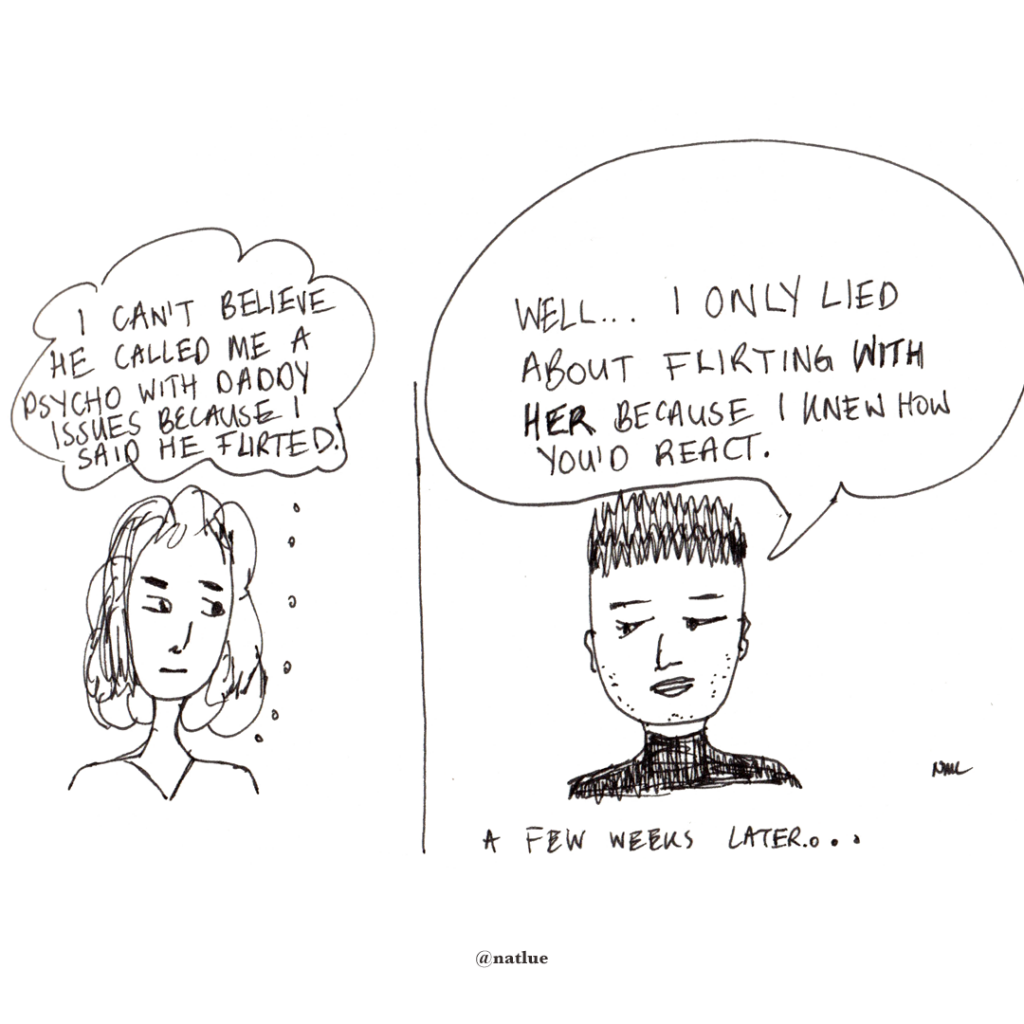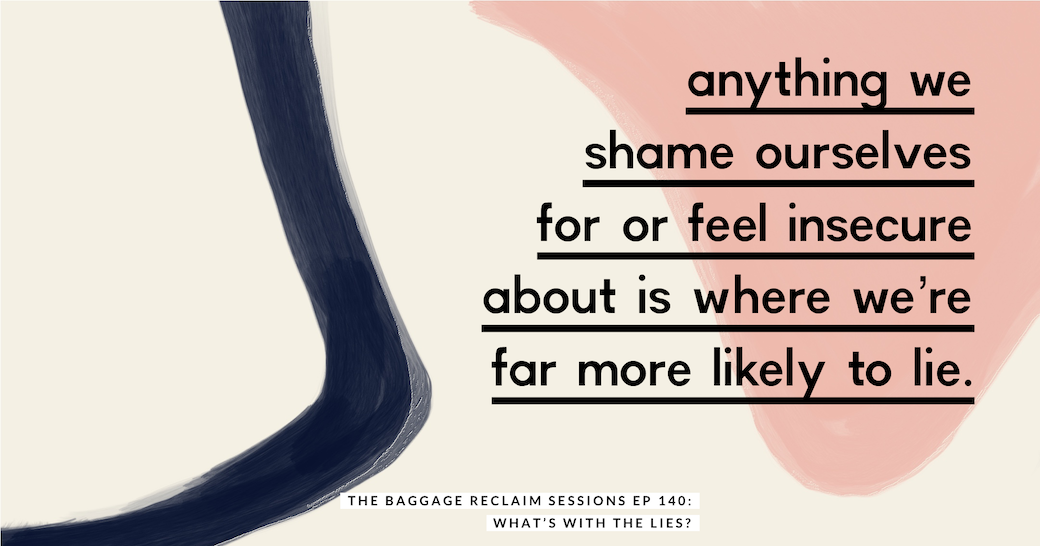
I think it’s fairly safe to say that being lied to, especially when we’ve doubted the hell out of ourselves to believe the person in question, cuts deep. All past experiences of honesty (and lies) influence our attitude not just towards being honest but how we respond when we discover that we’re being lied to.
In this week’s episode of The Baggage Reclaim Sessions, I talk about why people tell lies, why it’s possible to lie but with the intent of pretending to be something we’re not to avoid vulnerability not to screw people over, and why, for example, how loving we are won’t make someone who avoids honesty be truthful.
Subscribe on Apple Podcasts | Spotify | Android
Some nuggets from the episode:
- Lying on CVs/resumes is really prevalent. People lie about their level of experience. They exaggerate their hobbies, interests and volunteering to position themselves in a particular way.
- Whether they’re ‘white’ lies, ‘big’ lies, exaggerations or whatever, they reveal someone’s insecurities as well as their honesty levels.
- When we realise that someone has lied, especially with something that we regard as entirely unnecessary (e.g. pretending that they play football), we wonder Why bother with the lie? And we wonder what it says about this person. Some of us, even, have an attitude of If you’re going to lie, go big or go home.
- When people feel rocked by someone’s lie from a place of “I never tell lies. I’m the most honest person”, I always encourage them to check in with themselves. It doesn’t mean that they’re ‘wrong’ to be uncomfortable due to the lie, but judging someone from a place of insisting that you’re always honest reveals a big blind spot.
Everybody has lied (or will). This is because we often pretend to be something that we’re not. We often try to spare people’s feelings. We struggle to say ‘no’ or even ‘maybe’ so then we will have to get out of that. And…. so we will often pad things out, pack in a whole load of fluff.
- So many people struggle to say no. We can’t just say no, we have to tell some big-ass story.
- It’s not that some of us necessarily set out to deceive or screw over anyone, it’s that we’re so insecure about being ourselves that we don’t realise how it leads to us living a lie.
Reasons why people lie:
- To gain an advantage. In their mind, the truth puts them at a disadvantage. They wouldn’t be able to get near that person or the situation if the truth were known.
- To get or avoid certain things. We lie, for example, to gain attention, affection, approval, love or validation, or to avoid conflict, criticism, stress, rejection, disappointment, loss and abandonment.
- To buy time. It’s, for instance, buying time to figure out how we’re going to handle things, to manage that person’s feelings. We are waiting for the ideal conditions for them to be receptive to the truth.
- Not feeling as if the other party deserves the truth. It’s this need-to-know-basis mentality where, for instance, someone suppresses the fact that they’re already married or in a relationship. Sometimes we don’t feel that somebody deserves the truth because we’re angry with them about a past hurt and so admitting the truth would seem like conceding. We wouldn’t, for instance, get to feel like the victim anymore.
Drip-feeding: getting the truth (or lies) in instalments.
- To make ourselves appear more attractive. We think that this is how to market ourselves. We think that the [exaggerated] hobbies and interests, the charity work, etc, say something about us as a person.
- We’re afraid that we’re going to be judged.
- We don’t see the lie as a lie. Joe in ‘You’, for example, thinks that his stalking, lies and hugely inappropriate behaviour are ‘love’.
- Because we want to fulfil someone’s fantasy. Sometimes it’s our perception of what we think they want. That person really wants this so I’m going to be it. Or, we become aware that the person isn’t interested in the truth. They want the fantasy. So we sell them the big dream.
- Fear of vulnerability. What if I tell this person about that thing and they judge me? What if they end it? What if they don’t want to be my friend anymore or that they that I’m a really bad person?
Whatever we shame ourselves or feel insecure about is likely to become an area where we have a higher propensity to lie. We might not see it as a lie, we might see it as self-protection.
- Pretending our needs are far less than what they are is a lie.
- Passive-aggressive people lie (and blame you for it) because they reason, for example, that they have to behave this way because people can’t handle the truth. When you’re understandably upset over the lie, they use that as evidence of their belief while ignoring that they, um, lied, and that that’s what you’re responding to.
- The reason why somebody lies to us is based on their associations with honesty: what they believe being honest means. If somebody feels that they’re going to be at a disadvantage by being honest with us, about being honest about who they are, they’ll lie. This has nothing to do with how much effort we have put into the relationship.
How much we’ll lie depends on:
- How much we want to change people’s perception of us or make people feel good about themselves to get what we want.
- Seeing things through this lens of ‘Everyone is my persecutor’. If I’m honest, it’s going to invite things I don’t want.
- How much we need to lie to ourselves.
- What will it mean if I believe what they’re telling me or doing? Who will I get to be or what will I have to do? Conversely, what will it mean if I don’t believe what they’re saying or doing? What will I have to be or do as a result? Our answers offer a clue why, for example, we might buy into someone’s Future Faking.
- For a lie to work, it needs to be plausible. Now, plausible is subjective, but a grain of truth can be enough for some. Our perception of boundaries influences our perception of plausibility.
- We tell white lies to, for example, get out of things, to avoid hurting people’s feelings or conflict, or to dodge introspection.
- Be honest, not because you expect to be rewarded but because it’s who you are.
Links mentioned
Please subscribe and/or leave a review on iTunes (how-to guide here) – it really helps in growing the show! If you’re new to podcasts, find out more about what they are and how to subscribe with this guide.
Listener questions can be emailed to podcast AT baggagereclaim DOT com and if there’s a topic you’d love me to talk about, let me know!
Nat xxx

 Add to favorites
Add to favorites 

Natalie,
Your comment at the end, essentially that the amount of dishonesty we accept from others is proportionate to how honest we are with ourselves – wow.
I have been involved with people who I knew were dishonest. I wasn’t lying to myself about their dishonesty, I recognized that they were telling lies. I also knew that if I called them out, they would just deny it and it would cause a fight. I said nothing. In hindsight, these individuals just weren’t very good people. I always thought that I stuck around because I’d learned to accept shoddy treatment through my parents’ example, but I’ve never thought about the honesty component here.
I found out, while still with one ex, that in addition to the one child he told me about, he also had other children by other women. I couldn’t tell him how I found this out, so…..I said nothing.
It was pretty messed up of him to lie, but equally, the fact that I ended up staying in spite of this huge omission is also not normal. I suppose my thought process was something along the lines of “he probably realizes that this doesn’t make him look great, and so it’s something he doesn’t reveal up front”. (Mind you, he never told me! And why would that justify the omission in any case?)
It’s interesting that this same guy was *so* judgmental of me though, and acting as though anything other than what he saw as perfection was a huge problem. I have graduate degrees, and he wanted me to send him my transcripts and indicated that I needed to have straight A’s (he didn’t go to university). Once he lamented that I wasn’t a virgin, and on another occasion, talked about how he needed to go back to his country of origin to find a virgin (when he had multiple children! And also, you’re with me and saying this – wtf!)
He also lied about all kind of things big and small. I could never understand all of the smaller, totally unnecessary lies (that were also transparent). What’s the point? And also, do you take me for a fool?
What do I make of this now, Natalie? I think that I’m better at spotting bs now and am more put off by it, but I’m worried that these examples say something about me 🙁
Staying in situations like this is about, to some extent, it feeling like home. Maybe what you need to explore is your resignation to dishonesty and possibly feeling as if you’re challenging an authority or being disloyal by calling out the perpetrators. The silence is an example of passive behaviour. It’s more about what you’re not doing by omission. I think that if you make it your goal to ‘understand’ why someone is lying, you will be there until kingdom come. Accept what you know wholly and fully at this time: that these people are dishonest. And then make your exit. The man’s behaviour was undoubtedly abusive, but people who are habitually deceptive project what they’re trying to suppress so, of course, he’s interrogating you about your life because he himself is living a lie. There’s nothing to make of it. Get out.
Dear L, I don’t get what sort of encouragement are you looking for here. Do you want to justify your staying with this guy or are you opting out?
If you want to do the latter. The sooner you shut the door to your life in front of him, the better.